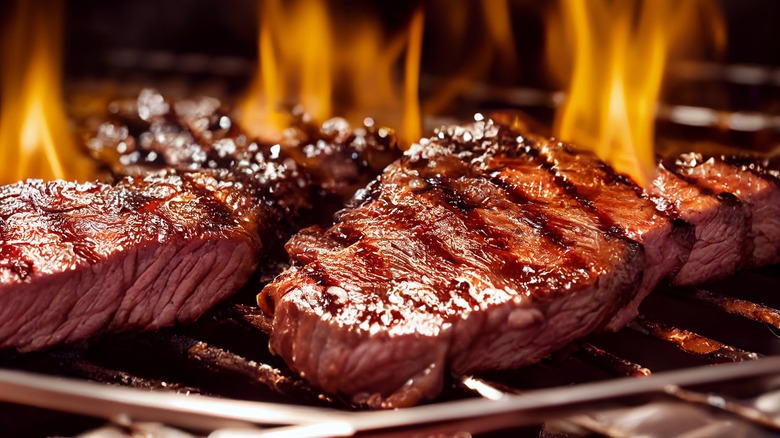Eating This Type Of Protein Can Increase Your Risk Of Kidney Stones
Your kidneys serve to filter out waste, toxins, and excess fluid from your bloodstream as urine. They also help maintain your body's pH level and your blood pressure. When your urine becomes too concentrated, crystals can form from the many chemicals in your kidneys. These are kidney stones. They can continue to grow inside your kidney, or smaller stones can get passed through your urine without pain. Sometimes a kidney stone can be painful when it grows large enough so that it clogs the ability for urine to pass.
Dehydration can cause a kidney stone because the lack of fluids makes your urine more concentrated. Your diet can also increase your risk of a kidney stone. According to the Urology Care Foundation, about 80% of kidney stones are made from calcium, but it might not be that you have too much calcium in your diet. Instead, too much sodium can prevent calcium from being reabsorbed into your body. Acidic foods can cause both calcium and uric acid stones to form in your kidneys. If most of the protein in your diet comes from animal sources, you'll make your body and urine more acidic and increase your risk of kidney stones.
Many animal proteins increase your risk of kidney stones
A 2022 review in Advances in Nutrition analyzed the results of 14 studies focused on the connection between various protein sources and the incidence of kidney stones. Diets high in non-dairy animal protein were linked to an 11% higher risk of developing kidney stones. It gets worse from there. Eating any meat products is associated with a 22% increased risk. Eating more processed meat, like bacon and hot dogs, raises your risk by 29%. For every 100 grams (about 3.5 ounces) of red meat you eat every day, your risk of getting a kidney stone goes up by 39%. However, the analysis showed that chicken, fish, and dairy were not directly linked to kidney stones.
Not all analyses found such a high risk for meat eaters, but your risk of developing kidney stones might have more to do with the ratio of animal-to-plant protein sources. According to a 2019 article in The Journal of Urology, people who ate more animal protein were 16% more likely to develop kidney stones than those who consumed less protein in their diets. But that doesn't necessarily mean that too much protein can become a problem, especially if some of your protein comes from plants. People who consumed a higher ratio of animal protein to plant protein had a 17% higher risk of kidney stones; plant protein was not determined to be associated with a risk of kidney stones.
Kidney stones and certain diets
Kidney stones are more common than you think. According to the University of Florida Department of Urology, one out of every eight men and one in 16 women will get kidney stones in their lifetime. Part of this prevalence of kidney stones can be linked to various diets that emphasize more carbs or protein. Rather than use a holistic approach to weight loss, many diets will restrict some macronutrients (e.g., carbs) while emphasizing others (e.g., fats or protein). A 2021 systematic review in Nutrients took a closer look at how these diets might foster an environment for kidney stones.
When a high-protein diet emphasizes animal protein, this could increase your risk of uric acid kidney stones. However, because the Paleo diet emphasizes unprocessed foods, consuming fresh fruit and vegetables counterbalances the acidic nature of animal protein. You'll need to make sure you take calcium supplements on the Paleo diet because you could be at risk for calcium-oxalate kidney stones. For the same reason, people who follow a vegetarian or vegan diet should also ensure they get enough calcium. The study also warned that following a keto diet long-term could increase your risk of kidney stones if you don't drink plenty of water.



